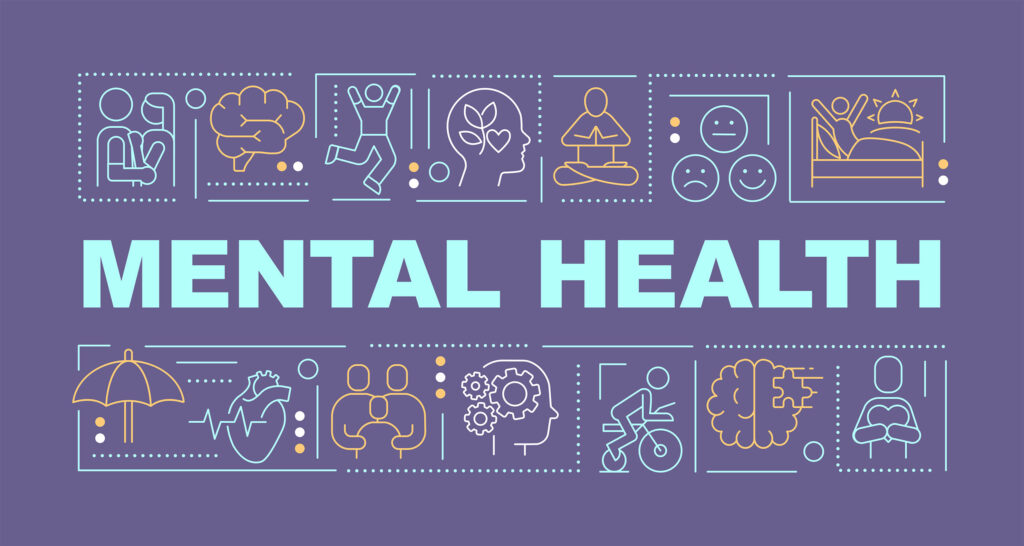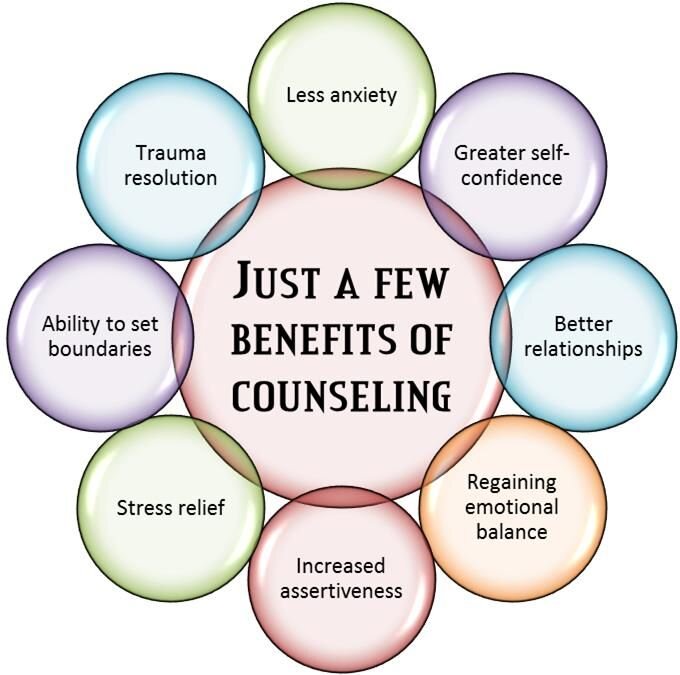The Relevance of Mental Health And Wellness: a Deep Study Therapy, Treatment, and Their Advantages
Psychological health and wellness significantly forms private health, impacting ideas, feelings, and habits. Counseling and therapy work as essential methods for healing and individual development. They use organized support, helping people navigate life's obstacles. Yet, lots of remain not aware of the details kinds of treatment readily available and their distinct advantages. Recognizing these facets is essential for anyone taking into consideration professional mental wellness support. What complies with might illuminate paths to strength and satisfaction that several neglect.
Comprehending Mental Wellness and Its Influence
Psychological wellness is often overlooked, it plays a necessary duty in total wellness and daily performance - Marriage Counselling. It encompasses emotional, emotional, and social aspects that influence exactly how people think, feel, and behave. An individual's psychological health straight impacts their capacity to take care of stress and anxiety, connect to others, and choose. Poor psychological health and wellness can lead to numerous problems, consisting of anxiousness, anxiety, and difficulty in keeping partnerships, every one of which can impede specialist and individual growth.Furthermore, psychological wellness has far-ranging ramifications for physical health. Chronic stress and untreated mental problems can add to different physical disorders, such as cardiovascular disease and compromised immune actions. Alternatively, favorable mental wellness cultivates resilience, allowing individuals to manage life's obstacles effectively. Understanding psychological health's importance is important for cultivating encouraging atmospheres that promote psychological well-being, thus improving the top quality of life for communities and people alike
The Different Sorts Of Therapy and Therapy
In the domain name of psychological health and wellness, various therapy and treatment kinds accommodate varied needs. Specific counseling techniques concentrate on individual issues through one-on-one sessions, while team therapy characteristics foster shared experiences and support amongst participants. Understanding these techniques is essential for picking the suitable treatment for different difficulties.
Private Therapy Techniques
Many individual therapy techniques exist, each developed to address particular psychological health concerns and satisfy differing client requirements. Cognitive Behavior Modification (CBT) focuses on determining and altering unfavorable thought patterns, while Psychodynamic Treatment explores past experiences and unconscious processes. Humanistic Treatment highlights personal development and self-actualization, promoting an encouraging setting. Interpersonal Treatment (IPT) targets partnership problems and interaction patterns to enhance emotional well-being. Furthermore, Acceptance and Dedication Therapy (ACT) urges customers to accept their ideas and sensations while committing to personal values. Each strategy uses unique methods and approaches, enabling professionals to tailor their techniques to the individual, thus boosting the healing experience and promoting psychological health and wellness recovery.
Group Therapy Dynamics
Group therapy characteristics include numerous restorative strategies that utilize the power of shared experiences and interpersonal partnerships. This form of therapy typically includes diverse teams, promoting a secure environment for participants to express sensations and ideas. Secret kinds of group therapy consist of assistance teams, which offer emotional assistance; process-oriented groups, concentrating on interpersonal interactions; and psychoeducational groups, targeted at giving understanding concerning mental wellness concerns. The dynamics within these teams can enhance self-awareness, as members often mirror on their actions in connection to others. In addition, team therapy fosters a sense of belonging, decreasing sensations of seclusion. Through shared stories and collective analytic, individuals can establish dealing methods and acquire insights, eventually contributing to private growth and healing.
The Role of Therapy in Mental Health
Therapy plays a vital duty in psychological health by providing numerous strategies customized to individual requirements. These methods supply expert support that can lead to considerable renovations in psychological health. Understanding the different kinds of counseling can aid individuals make informed decisions about their mental healthcare.

Kinds Of Counseling Strategies
While various counseling techniques exist, each deals unique methodologies and insights into mental wellness therapy - Mental Health Resources. Amongst the most noticeable are cognitive-behavioral treatment (CBT), which concentrates on changing adverse idea patterns; psychodynamic treatment, which explores subconscious procedures and childhood experiences; and humanistic methods, stressing personal development and self-actualization. Additionally, solution-focused quick treatment prioritizes locating options in today instead of delving into issues. Team therapy fosters community and shared experiences, while family therapy addresses relational characteristics within familial structures. Each method accommodates various requirements, aligning with individual choices, concerns, and therapeutic objectives. Recognizing these approaches aids clients make notified choices concerning their mental health journey and advertises efficient treatment tailored to their special conditions
Benefits of Expert Guidance
Numerous individuals gain from expert support in handling their psychological health obstacles. Therapy uses a secure area for customers to explore their thoughts and feelings without judgment. This therapeutic setting cultivates self-awareness, permitting people to identify patterns in their actions and develop healthier coping techniques. Expert support likewise provides access to evidence-based methods that can ease signs of anxiousness, clinical depression, and various other mental health and wellness problems. Therapists can aid in setting sensible objectives and use assistance in accomplishing them, boosting overall well-being. The collective connection in between counselor and customer is important, as it advertises accountability and urges personal development. Inevitably, expert advice plays a vital role in guiding mental health trips, leading to enhanced psychological durability and life contentment.
Advantages of Treatment: Healing and Growth

Just how to Choose the Right Therapist or Therapist
Exactly how can one browse the commonly overwhelming procedure of selecting the best specialist or counselor? Determining individual requirements is crucial; people must consider their details problems, whether clinical depression, stress and anxiety, or relationship obstacles. It is useful to study different therapeutic methods, such as cognitive-behavioral therapy or psychodynamic treatment, to discover an appropriate match.Next, prospective clients must seek recommendations from trusted resources or utilize online directory sites. It is crucial to examine specialists' qualifications, including their education, licensing, and areas of specialization. Setting up initial examinations can help assess compatibility, enabling individuals to assess communication styles and individual comfort.Finally, logistical elements, such as place, schedule, and fees, ought to additionally be thought about. By thoughtfully weighing these elements, one can make an informed decision, eventually cultivating a restorative partnership that sustains mental wellness and personal growth.
Overcoming Stigma: Embracing Mental Health Support
While social mindsets towards psychological health have progressed, stigma still provides a significant barrier for several seeking support. This preconception typically shows up as mistaken beliefs surrounding mental disorder, leading people to really feel shame or worry regarding their struggles. Numerous people hesitate to go after counseling or treatment because of fret about being judged or labeled. Conquering this stigma is basic for promoting a supportive setting where people can freely review their mental health needs.Communities and companies play an essential function in this change by advertising awareness and education and learning concerning mental wellness issues. Campaigns that highlight individual tales can humanize these experiences, motivating others to look for assistance without fear. As acceptance expands, people might really feel much more encouraged to accept psychological wellness support, recognizing it as a vital facet of general well-being. By dismantling preconception, culture can grow a society of understanding, empathy, and positive mental wellness care.
Techniques for Maintaining Psychological Wellness Beyond Therapy
Therapy offers valuable support, keeping psychological wellness outside of sessions is equally essential. People can carry out numerous approaches to sustain their psychological health. Normal physical task plays a crucial role, as workout advertises the launch of endorphins, which boost mood. Additionally, a balanced diet rich in nutrients can greatly impact psychological stability and energy levels.Practicing mindfulness and meditation assists individuals handle stress and create higher self-awareness. Developing a constant sleep routine is also fundamental, as high quality remainder is essential for cognitive function and like this emotional regulation.Engaging in social activities promotes link and lowers feelings of seclusion. Going after pastimes or rate of interests can provide a creative outlet and boost self-esteem. Establishing practical objectives and practicing self-compassion allows individuals to grow strength. By incorporating these techniques into day-to-day live, people can successfully support their psychological well-being beyond treatment sessions.
Often Asked Concerns

How Can I Inform if I Required Therapy?

Identifying the requirement for treatment typically includes recognizing consistent feelings of sadness, anxiousness, or frustrating tension. If everyday operating comes to be challenging or coping devices fail, looking for professional assistance may be a useful advance.
What Should I Expect in My Initial Treatment Session?
In the initial treatment session, people can expect an intro, conversation of their reasons for looking for help, and a review of the specialist's approach, producing a structure for future conversations and developing convenience in the therapeutic area.
Are Online Treatment Sessions as Effective as In-Person Ones?
Study indicates that online treatment blog here sessions can be as efficient as in-person ones. Factors such as the specialist's qualifications, customer interaction, and the restorative partnership considerably influence outcomes, despite the tool made use of.
Can Treatment Aid With Partnership Concerns?
Treatment can assist people in attending to partnership issues by giving devices for communication, recognizing feelings, and solving disputes. Cognitive Behavioural Therapy. It promotes healthier characteristics and urges individual growth, ultimately fostering more powerful, more meeting links between companions
Just How Lengthy Does Treatment Usually Last?
Treatment duration differs considerably based upon individual requirements and objectives. Commonly, sessions might last from a couple of weeks to several months, with some people participating in recurring treatment to deal with long-lasting issues and individual development. Cognitive Behavioral Therapy (CBT) concentrates on identifying and transforming adverse idea patterns, while Psychodynamic Therapy discovers subconscious processes and previous experiences. Trick kinds of group treatment include support teams, which provide emotional support; process-oriented groups, concentrating on social communications; and psychoeducational groups, intended at passing on understanding about psychological health concerns. Amongst the most noticeable are cognitive-behavioral therapy (CBT), which concentrates on changing adverse thought patterns; psychodynamic therapy, which checks out subconscious procedures and childhood years experiences; and humanistic approaches, stressing individual development and self-actualization. Group therapy cultivates area and shared experiences, while household therapy addresses relational dynamics within familial structures. It is advantageous to study numerous therapeutic techniques, such as cognitive-behavioral therapy or psychodynamic treatment, to discover an ideal match.Next, possible clients ought to look for references from relied on sources or make use of on-line directory sites.